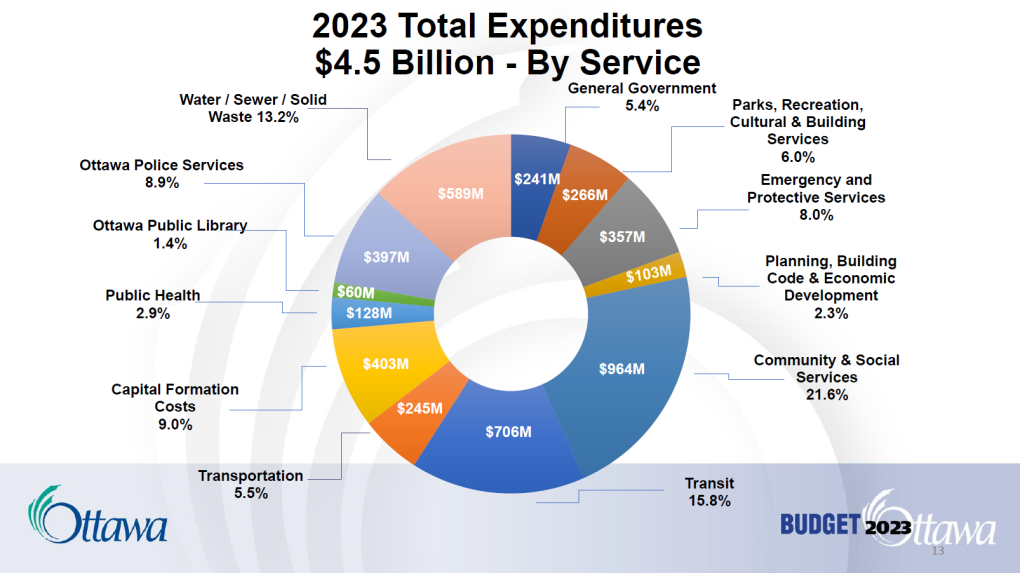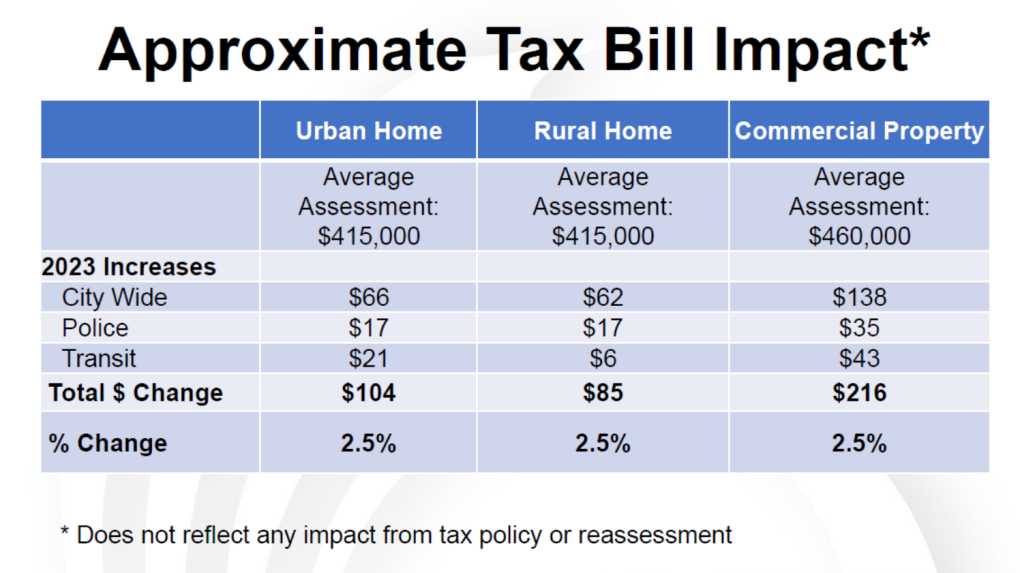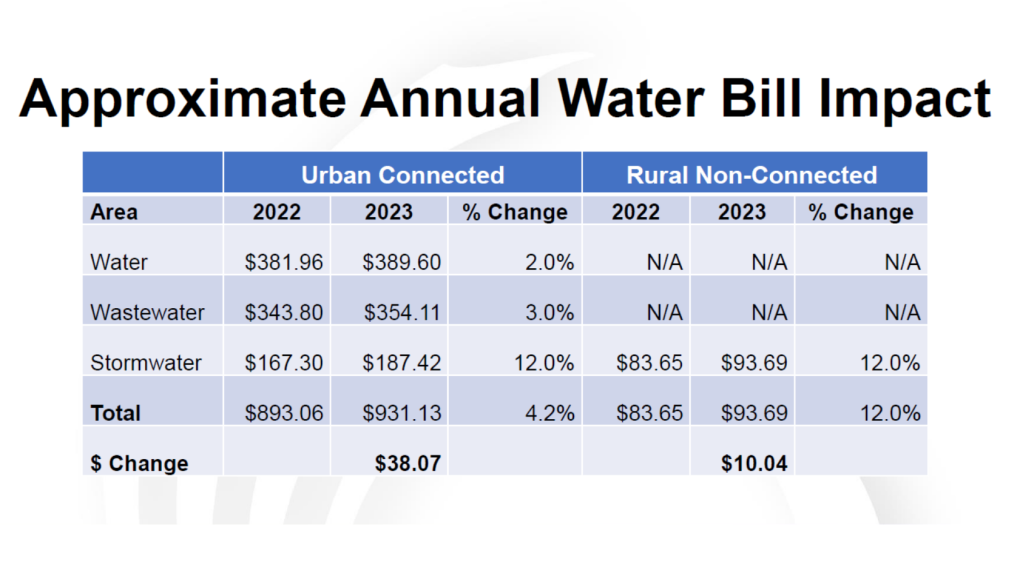'This is a tight budget:' City of Ottawa tables draft spending plan
The city of Ottawa has tabled a belt-tightening draft budget amid increasing financial pressures.
"Make no mistake, this is a tight budget," Mayor Mark Sutcliffe told council as he presented the first draft budget of his term on Wednesday.
The draft budget, $4.5 billion in operating costs and $1.06 billion in capital costs, includes a 2.5 per cent property tax increase and a freeze on transit fares.
 The City of Ottawa's 2023 operating budget at a glance. (Source: City of Ottawa)
The City of Ottawa's 2023 operating budget at a glance. (Source: City of Ottawa)
Sutcliffe said staff have also identified $54 million in "savings and efficiencies" that mean programs and services won't need to be cut.
"Those efficiencies help us reinvest in our priorities," he said.
However, Sutcliffe said the city will need help from other orders of government down the line.
"Without the appropriate level of support from our provincial and federal governments, we will have significant pressures on our finances next year and beyond, particularly on transit and infrastructure," he said.
Sutcliffe told reporters he believes the 2023 budget is reasonable, but he acknowledges other levels of government will need to chip in.
"We know that, for example, there's more stable transit funding coming from the federal government in 2026, but we have to get to 2026," he said. "If the provincial and federal governments were supporting public transit last year and the year before... then they should continue to support us until it's back to normal levels."
Wendy Stephanson, interim city manager, said the budget "couples responsible fiscal spending while finding efficiencies to ensure the city remains responsive, protects the health, safety and well-being of our community, and bolsters the resilience of our local economy."
Sutcliffe said the principles of the budget include protecting the services that Ottawa residents rely on, keeping costs as low as possible for residents, establishing a solid fiscal foundation for the city and continuing to invest in critical infrastructure.
Most of the $54 million in efficiences--$47 million--comes from transit. Of that amount, $42.7 million is capital spending and $4.3 million is from OC Transpo bus fleet optimization. Transit Services General Manager Renée Amilcar told reporters part of the savings come from removing 117 older buses that are expensive to maintain. Amilcar said more information would be presented Feb. 9 at transit commission.
Efficiencies $53.9 million
- Discretionary spending savings: $0.8 million
- Hydro volume savings -- tax and rate: $0.8 million
- Building lease savings: $0.4 million
- LED conversion savings: $2.2 million
- Organizational alignment savings: $2.2 million
- Transit Capital program alignment: $42.7 million
- Transit Bus fleet optimization: $4.3 million
- Police: $0.5 million
The draft transit budget is expecting ridership at 70 per cent of pre-pandemic levels.
A 2.5 per cent property tax increase would add $104 to an urban property taxpayer with a home assessed at $415,000. Rural taxpayers can expect an increase of $85. Commercial properties valued at $460,000 will see their property taxes rise by $216 this year.
 The approximate growth in the average property tax bill in 2023 (* Does not reflect any impact from tax policy or reassessment). (Source: City of Ottawa)
The approximate growth in the average property tax bill in 2023 (* Does not reflect any impact from tax policy or reassessment). (Source: City of Ottawa)
The draft budget also includes an approximate increase of $38 to the average urban water bill and $10 for rural non-connected residents.
 Average impact to water bills for average users in 2023. (Source: City of Ottawa)
Average impact to water bills for average users in 2023. (Source: City of Ottawa)
Earlier Wednesday, the Ottawa Police Services tabled its budget, with just over $401 million in spending, about 9 per cent of the city's overall budget. That includes money for 25 new full-time positions.
The police budget equates to an increase in $17 in taxes for the average household, bringing the total to $680 for the average Ottawa residence. The increase comes in a time when police are facing greater scrutiny over spending and greater opposition to funding increases.
Critics also oppose the additional police funding when the City of Ottawa is facing budgetary pressures in other areas, such as public transit.
The Ottawa Police Services Board unanimously approved a plan to direct staff to draft the next budget based on a 2.5 per cent tax increase and an estimated 2.2 per cent increase in taxes resulting from growth at its meeting Jan. 23.
The police services board will vote to approve its 2023 budget Feb. 27, before it heads to council March 1 for final approval.
Council directed 2.5 per cent increase
Council voted to direct staff to draft the city budget with a 2 to 2.5 per cent property tax increase, and directed the library, public health, police and transit commission to develop draft budgets with a maximum 2.5 per cent increase.
Ottawa Public Health's 2023 budget is drafted at $128 million. The Ottawa Public Library Board has drafted a $60.5 million budget for 2023.
Some councillors have criticized an across-the-board 2.5 per cent cap on budget increases, because it favours larger budgets, like the Ottawa Police Service, while hindering smaller departmental budgets.
"That equates to $1.3 million (more) for public health, and yet we’re increasing the police budget by $15 million," said Coun. Shawn Menard during the debate on budget directions in mid-December.
Inflation is the main driver for the pressures the city is facing. Revenues are also under pressure, as OC Transpo ridership remains below pre-pandemic levels and council has approved a plan to freeze fares at 2022 levels for the year, while staff had recommended a 2.5 per cent fare increase. Freezing fares would mean $5 million less in revenue, according to staff. Sutcliffe has also vowed to reduce youth recreational program fees by 10 per cent, at a cost of about $350,000.
Staff say they will be including a "list of efficiencies and opportunities" as part of the 2023 budget. Sutcliffe has also vowed a line-by-line spending review to find $35 million in efficiencies at Ottawa City Hall.
The budget to come before council today is based on directions approved at a meeting on Dec. 14. The budget directions passed by a vote of 16 to 9.
In favour were: Cathy Curry, Glen Gower, David Brown, Matthew Luloff, Allan Hubley, Catherine Kitts, George Darouze, Stéphanie Plante, Laura Dudas, Wilson Lo, Jessica Bradley (with a dissent against the 2 to 2.5 per cent increase to the police services levy), David Hill, Tim Tierney, Steve Desroches, Clarke Kelly, and Mayor Mark Sutcliffe.
Against were: Riley Brockington, Theresa Kavanagh, Rawlson King, Jeff Leiper, Shawn Menard, Ariel Troster, Marty Carr, Sean Devine, and Laine Johnson.
Budget at a glance
2023 total expenditures: $4.5 billion
- Community and social services: $964 million (21.6%)
- Transit: $706 million (15.8%)
- Water/sewer/solid waste: $589 million (13.2%)
- Capital formation costs: $403 million (9%)
- Ottawa Police Services: $397 million (8.9%)
- Emergency and protective services: $357 million (8%)
- Parks, recreation, cultural and building services: $266 million (6%)
- Transportation: $245 million (5.5%)
- General government: $241 million (5.4%)
- Ottawa Public Health: $128 million (2.9%)
- Planning, building code, and economic development: $103 million (2.3%)
- Ottawa Public Library: $60 million (1.4%)
2023 total revenue: $4.5 billion
- Property taxes: $2.057 billion (46.1%)
- Federal/provincial/municipal grant: $1.033 billion (23.2%)
- Fees and service charges: $990 million (22.2%)
- Payment in lieu of taxes: $172 million (3.9%)
- Reserves: $129 million (2.2%)
- Other: $79 million (1.8%)
2023 capital program: $1.06 billion
- Integrated roads, water and wastewater services: $245.9 million (23.3%)
- Drinking water, wastewater and stormwater services: $211.2 million (20%)
- Transportation services: $206.5 million (19.5%)
- Other tax supported services: $199.5 million (18.9%)
- Transit services: $134.2 million (12.7%)
- Police services: $60 million (5.7%)
2023 capital program by funding source:
- Reserves: $660.9 million (62.5%)
- Debt: $223.2 million (23.9%)
- Development charges cash and debt: $131.5 million (12.4%)
- Revenue: $11.7 million (1.1%)
--With files from CTV's Josh Pringle.
CTVNews.ca Top Stories

BREAKING 'Canadians deserve a real choice': Justin Trudeau resigning, prorogues Parliament
Prime Minister Justin Trudeau is stepping down as Liberal leader, and is proroguing Parliament as the Liberal Party of Canada embarks on the journey to replace him.
WATCH LIVE Justin Trudeau resigns as Liberal leader: Follow live updates
Prime Minister Justin Trudeau has stepped down as Liberal leader. Follow along for live updates from CTVNews.ca.
'Together, what a great nation it would be': Donald Trump, Elon Musk react to Justin Trudeau's resignation
Amid news of Prime Minister Justin Trudeau's resignation as leader of the Liberal party on Monday morning, reactions from prominent figures began piling in.
Justin Trudeau is resigning, what will be his legacy? A look back at key political eras
In a seismic political move, Justin Trudeau has announced his intention to step down as leader of the Liberal Party of Canada and prime minister, once his successor is named. This decision comes after more than nine years in the country's top job and nearly 12 years at the helm of his party.
W5 INVESTIGATES One Canadian couple's fight against a contractor who defrauded them
Pull into the driveway at John and Julie Ridley's house and you'll notice large patches of red siding are missing from their house and garage. What was supposed to be a dream retirement home for the couple is now a daily reminder of what went wrong.
Justin Trudeau resignation: Here's what he said in Ottawa today
Prime Minister Justin Trudeau delivered a speech about his political future Monday morning outside Rideau Cottage in Ottawa. Here's the message he delivered to Canadians.
Winter storm warnings in effect for most of Canada. Here's where
A weekend winter storm that brought much of Canada under severe weather alerts continues to bring chilly conditions to Canadians across the country.
'He won't be a John Doe anymore': OPP use new DNA testing to solve 21-year-old cold case
OPP have used new DNA technology to solve a 21-year-old cold case near Amherstburg, Ont. The new testing has led to the identification of the remains of a man found in 2003.
U.S. Postal Service resumes accepting mail and packages to Canada
The United States Postal Service is resuming accepting mail and packages to Canada following the end to service disruptions from the month-long Canada Post strike.























